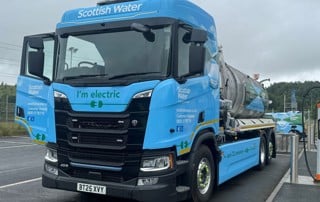Charging downtime is costing job need electric fleets eight times more than the electricity used to top up the batteries, according to estimates from Co Charger.
The neighbourhood community charging business estimates that time lost to charging typically costs £17,000 per year per asset or around 260 non-productive hours across a 12-month period to charge while “on shift”.
Co Charger has now expanded its offering to cater to return to home fleets with a particular focus on electric vans to address the problem.
Joel Teague, Co Charger chief executive, says the move into creating something specifically catered to fleets was a natural development after the business noted the increasing number of business vehicles using its current network of 6,000 hosts.
The Co Charger concept matches EV drivers with a neighbourhood host who rents out their home charger for a fee during slots convenient for them. This enables drivers to charge their vehicles within walking distance of their home without having to rely on public infrastructure.
Teague told Fleet News: “For many fleet operators, the cost of electricity is not the issue.
“Instead, the significant financial burden comes from the time lost while charging, which has become a significant barrier to electrification, particularly in light commercial fleets (LCV).”
Co Charger’s 6,000-strong network has increased from 4,500 last year and Teague is planning to grow this number significantly in the coming years with partnerships, with the overall aim to reach 16,000 locations.
Teague emphasises that Co Charger is not a complete solution but an effective way to “shrink the problem” of charging access, making it easier for operators to manage their electrified fleets.
One of the unique aspects of Co Charger’s service is its pricing model. Co Charger Hosts normally set their own charging rates, but for fleet clients, Co Charger negotiates a fixed rate of around 42p per kWh, offering fleet managers the certainty they need to plan their operations. The benefit to hosts is an increased volume of regular users.
Additionally, Co-Charger allows fleet operators to secure exclusive access to certain charging points for a monthly fee of £30, ensuring their drivers can reliably charge without competition.
Teague says there has not been any push back from current hosts that are wary of inviting larger vehicles onto their driveways.
He said: “Not one person has raised this as an issue. There have been a couple of cases where the frequency of charging sessions has been an issue, as fleets generally need access more than a regular driver. But the vast majority of hosts are open to inviting vans to use their charger.”
The platform has also proven beneficial for taxi and ride-hailing drivers.
Teague notes that professional drivers, who may charge their vehicles five or six times more frequently than private users, represent a growing share of Co Charger’s sessions.
Uber has already partnered with Co Charger for its driver onboarding program.
Teague says some Uber drivers were previously queuing at public stations late at night in order to charge.
As fleets continue to electrify, one of the biggest concerns is ensuring that charging infrastructure can keep up with demand.
Teague describes Co Charger as “the second-largest EV charging network in the UK” with 67% of people in the UK living within a mile of a Co Charger host.
The LCV market has been slower to electrify compared to passenger cars, with the percentage of electrified vans stalling at under 5%, according to figures from the Society of Motor Manufacturers and Traders (SMMT).
Three billing options are available for fleets: drivers can pay for their charging directly with fleet operators reimbursing them through existing systems.
Alternatively, Co Charger can integrate with aggregate payment platforms or in some cases fleets are using a virtual business debit card like Revolut.
Looking ahead, Co Charger is actively expanding through new partnerships and pilots, with a goal to scale its network to meet the growing demands of fleet electrification.
Co Charger has already completed three pilot projects with fleets and is looking to expand this further to another six.
The business charges a set-up fee of £5,000 for working consultatively with fleets to match drivers with the right hosts, as well as manage all the administration and analysis needed to line-up operational schedules and efficiencies.
Teague added: “We’re actively looking to take on a further six pilots with fleets over the next six months, with each running for three months long.
“We’re looking for fleet operators that already have electric LCVs and are currently reliant on public charging.
“We need to find those drivers that are close to an existing host. We can then start rolling this out on a wider basis by looking at those patterns and the way this works with working fleets.”
























Login to comment
Comments
No comments have been made yet.